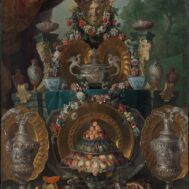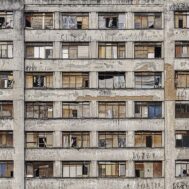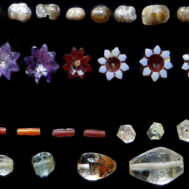Updated December 28, 2017.
The Mayor of Düsseldorf, Thomas Geisel, in response to international uproar over the cancellation of the exhibition, “Max Stern — From Düsseldorf to Montreal,” announced today that the exhibition will go forward, but the opening will be delayed until October 2018, and an international symposium on Stern will be organized by the city in order to research the subject further and discuss “possible forms of communicating and documenting it.”
December 14, 2017. Last Minute Cancellation of Show on Victim of Nazis Causes Consternation.
The city of Düsseldorf has been thrust into a maelstrom of criticism from museum professionals worldwide over its mayor’s last-minute cancellation of a joint Canadian-German exhibition, “Max Stern — From Düsseldorf to Montreal.” Three years into plans for an exhibition about the Jewish art dealer Max Stern, and just two months before its scheduled opening at the Stadtmuseum-Landeshauptstadt Düsseldorf, mayor Thomas Geisel abruptly cancelled the show. The mayor’s decision caused consternation in the art world, and German cultural officials and Canadian museums and curators who had been working together on the exhibition expressed dismay and disbelief at the reasons given for the cancellation.
Geisel said briefly in explanation that there were concerns about the listing, as part of the exhibition, claims against paintings in German museums by the Max Stern Art Restitution Project. During his life, Max Stern actively sought restitution of paintings he was forced to sell or which were seized during the Nazi era, and the Max and Iris Stern Foundation has been actively seeking Nazi-seized artworks from Max Stern’s collection since 2002. One such painting, by the artist Wilhelm von Schadow, is owned by the city of Düsseldorf, and previously hung in the mayor’s office. The city disputes the foundation’s claim to the painting, but the mayor said that unresolved claims against paintings in other German museums were the reason for the cancellation.
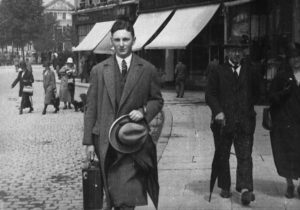
Max Stern in Germany, circa 1925. Credit National Gallery of Canada, Library and Archives.
U.S. and Canadian art experts have responded that this makes no sense, as the paintings claimed by the foundation have been sought for years, and there are many other publicly known Nazi-related claims extant for works in German museums. Ronald Lauder, president of the World Jewish Congress, pointed out in a letter to Mayor Geisel that the German government has sponsored a current exhibition in Bonn of artworks from the Nazi-era cache of Cornelius Gurlitt, and their provenance is still being researched.
The partnering Canadian museum and universities see no reason why the well-known claims should result in the cancellation of the show; especially since it was focused on the basis of goodwill between the city and the Max and Iris Stern Foundation. Concordia University history professor Frank Chalk told CBC Montreal that the cancellation was, “A bolt from the blue that has shocked and amazed and outraged all of us connected with the project.”
Another painting by Schadow, also in Düsseldorf’s collection, had been returned by the city to the Max Stern Foundation in 2014, but was then lent back by the foundation to Düsseldorf’s Stadtmuseum. This restitution and the loan back to Germany inspired the joint exhibition that was to be held at the Stadtmuseum. The exhibition had been largely funded by Jewish donors in Montreal, and curated by both Canadian and Düsseldorf Stadtmuseum curators working in concert.
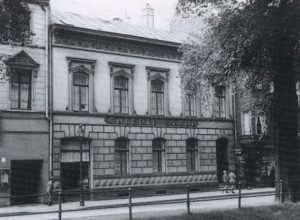
Gallerie Stern, 1937. http://www.concordia.ca/arts/max-stern/context.html.
The exhibition was scheduled to open in Düsseldorf in February 2018, then travel to Haifa, Israel and then to the McCord Museum in Montreal. The McCord’s president, Susan Sauvage, said that she learned of the cancellation as the catalog was on its way to the printer, and that a cancellation at the last minute was something she had never seen before. She said the loss of the exhibition would be a real disappointment to Montreal residents, who could have learned much more about the Sterns’ patronage of the arts in Canada.
Max Stern, who had inherited the prestigious Düsseldorf Stern Gallerie from his father, had been forced to close it and sell its inventory in 1937 in sale No. 392 at Cologne’s Third Reich-approved auction house Lempertz. Stern fled Germany with just a suitcase, winding up in detention camps for refugees in Britain and later in Canada. Stern met his wife Iris through a refugee organization. They settled in Montreal, where he became director of the Dominion Gallery.
Stern and his wife were enthusiastic promoters of the work of living Canadian artists; these included Emily Carr and Paul-Emile Borduas, and many of the members of the “Group of Seven.” Stern and his wife became generous patrons of both the arts and academic scholarship in Canada, donating over 160 artworks of importance to Canadian museums, particularly in Montreal.
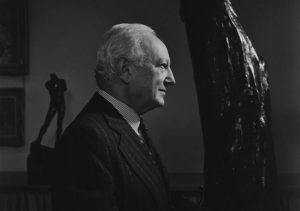
Max Stern.
When Stern died in 1987, he left his estate to two Montreal universities, Concordia and McGill, and to Hebrew University in Jerusalem. The Max and Iris Stern Foundation website points out that the three universities have benefited for many years from the funding support the Sterns provided for scholarships, internships, exhibition programming, museum staffing, and provenance research, including the Max Stern-McCord Museum Fellowship. Mindful that Max Stern never gave up in seeking return of artworks taken by the Nazis, in 2002, the universities established the Max Stern Art Restitution Project through the Max Stern Foundation. The project’s goal was to continue to seek restitution of artworks owned by Max Stern. So far, the project has recovered 16 artworks. About 400 works of art seized by the Nazis remain missing. All are listed on the foundation’s website and on the Art Loss Register.
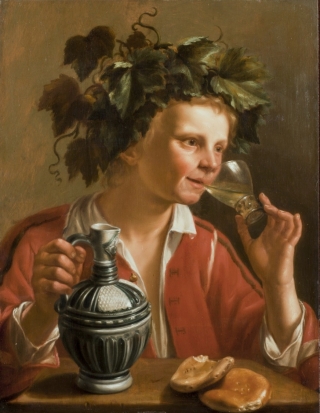 In February 2017, the FBI returned a Dutch Old Master painting, “Young Man as Bacchus” by Jan Franse Verzijl (1599-1647) to representatives of the Max and Iris Stern Foundation. Courtesy Max and Iris Stern Foundation.
In February 2017, the FBI returned a Dutch Old Master painting, “Young Man as Bacchus” by Jan Franse Verzijl (1599-1647) to representatives of the Max and Iris Stern Foundation. Courtesy Max and Iris Stern Foundation. 